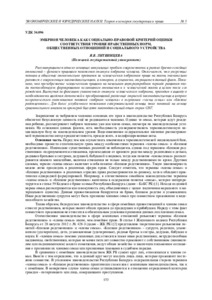Please use this identifier to cite or link to this item:
https://elib.psu.by/handle/123456789/13088Full metadata record
| DC Field | Value | Language |
|---|---|---|
| dc.contributor.author | Литвинцева, Я. В. | - |
| dc.date.accessioned | 2015-08-06T11:41:43Z | - |
| dc.date.available | 2015-08-06T11:41:43Z | - |
| dc.date.issued | 2015 | - |
| dc.identifier.citation | Вестник Полоцкого государственного университета. Серия D, Экономические и юридические науки. - 2015. - № 5. – С. 153-157. | ru_RU |
| dc.identifier.issn | 2070-1632 | - |
| dc.identifier.uri | https://elib.psu.by/handle/123456789/13088 | - |
| dc.description | Human Embryo as a Socio-Legal Criteria of Evaluation of the Correspondence of Moral Norms, Social Relations and Social Structure. Y. Litvintsava | ru_RU |
| dc.description.abstract | Рассматривается одна из основных актуальных проблем современности в рамках брачно-семейных отношений – феномен правового положения статуса эмбриона человека. Отмечается, что умеренные позиции в обществе относительно признания за человеческим эмбрионом права на жизнь значительно разнятся с современным законодательством, в котором, в сущности, отрицается данный факт. Показано, что пренебрежение человеческими правами на начальном внутриутробном периоде развития плода поспособствует формированию негативного отношения и к человеческой жизни в целом после его рождения. Выступая за фиксацию узаконенного статуса человеческого эмбриона, приходим к выводу о необходимости введения дополнений и преобразований различных отраслей законодательства в вопросе теоретического соотношения понятия «эмбрион человека» к терминам «члены семьи» или «близкие родственники». Для более углубленного понимания содержательной основы этих понятий на основе сравнительного анализа за критерий был взят законодательный опыт стран СНГ.= The legal status of the human embryo is one of the main challenges of the modern marriage and family relations. It should be noted that the moderate position in society towards the recognition of the right of the human embryo to life contradicts the current legislation, which denies this phenomenon. Consequently, the negligence of human rights at the early stage of fetal development will contribute to the formation of a negative attitude towards human life in general after birth. Advocating for the legalizatiоn of the human embryo status, the author comes to the conclusion that it is necessary to amend and transform various branches of law in terms of theoretical correlation between the concepts of the “human embryo” and “family members” or “close relatives”. In order to show a more profound meaning of the notions such as “family”, “close relatives” and “family members” the author has conducted comparative analysis of the legislative practice of the CIS countries. The results of the analysis of the foreign legal acts show that the value of the Belarusian termbase shall be improved in terms of theory. | ru_RU |
| dc.language.iso | ru | ru_RU |
| dc.publisher | Полоцкий государственный университет | ru_RU |
| dc.relation.ispartof | Веснік Полацкага дзяржаўнага ўніверсітэта. Серыя D, Эканамічныя і юрыдычныя навукі | be_BE |
| dc.relation.ispartof | Herald of Polotsk State University. Series D, Economics and law sciences | en_EN |
| dc.relation.ispartof | Вестник Полоцкого государственного университета. Серия D, Экономические и юридические науки | ru_RU |
| dc.relation.ispartofseries | Серия D, Экономические и юридические науки;2015. - № 5 | - |
| dc.rights | open access | ru_RU |
| dc.subject | Государственный рубрикатор НТИ - ВИНИТИ::ОБЩЕСТВЕННЫЕ НАУКИ::Государство и право. Юридические науки | ru_RU |
| dc.subject | Гражданское право | ru_RU |
| dc.subject | Сравнітельное правоведеніе | ru_RU |
| dc.subject | СНГ | ru_RU |
| dc.subject | эмбрион человека | ru_RU |
| dc.title | Эмбрион человека как социально-правовой критерий оценки соответствия уровня нравственных норм, общественных отношений и социального устройства | ru_RU |
| dc.type | Article | ru_RU |
| Appears in Collections: | 2015, № 5 | |
Files in This Item:
| File | Description | Size | Format | |
|---|---|---|---|---|
| 153-157.pdf | 170.07 kB | Adobe PDF |  View/Open |
Items in DSpace are protected by copyright, with all rights reserved, unless otherwise indicated.